- Home
- »
- Healthcare IT
- »
-
Clinical Alarm Management Market Size, Share Report, 2030GVR Report cover
![Clinical Alarm Management Market Size, Share & Trends Report]()
Clinical Alarm Management Market Size, Share & Trends Analysis Report By Product (Nurse Call System, Bed Alarms), By Component (Solutions, Services), By End-use (Hospitals & Clinics, Home Care Settings), By Region, And Segment Forecasts, 2024 - 2030
- Report ID: GVR-4-68039-592-8
- Number of Report Pages: 150
- Format: PDF, Horizon Databook
- Historical Range: 2018 - 2022
- Forecast Period: 2024 - 2030
- Industry: Healthcare
Clinical Alarm Management Market Trends
The global clinical alarm management market size was estimated at USD 2.13 billion in 2023 and is expected to grow at a compound annual growth rate (CAGR) of 17.0% from 2024 to 2030. Growing cases of alarm fatigue and the need for cost-containment are the factors expected to boost market growth. Furthermore, prolonged hospital stays coupled with technological advancements in this sector and rising prevalence of various chronic diseases are most likely to fuel market growth. Increasing cases of alarm fatigue are expected to boost the demand for alarm management solutions as well as services. Alarm fatigue is a significant concern in healthcare, leading to excessive non-actionable alarms that can compromise patient safety.
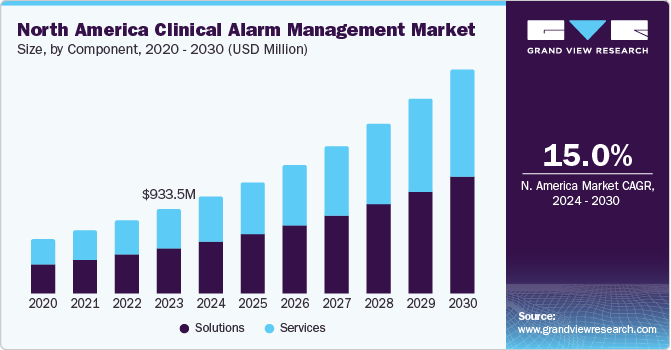
The Making Health Care Safer (MHCS) reports from the Agency for Healthcare Research and Quality (AHRQ) emphasize implementing safety culture elements, risk assessments, and training to reduce alarm burden and improve overall patient care. Owing to false alarms, the true alarms that are supposed to alert clinicians of the real problems with patients are ignored sometimes. This drives the demand for such solutions. Various benefits of alarm management solutions are also likely to increase their demand, which will support market growth.
These benefits are clinical, operational, as well as financial. Clinical benefits comprise improved patient and family satisfaction, enhanced sleep & rest, and reduction in non-actionable alarms & gaps in alarm protocol. This also enhances patient safety along with possibly fewer missed true positive alarms. Operational benefits include decreased alarm fatigue, staff satisfaction, less burnout, improved productivity, and better use of nursing resources.
Financial benefits include reduced staff turnover, decreased patient length of stay, and preventable patient harm & potentially costly repercussions from ICU transfers, extended span of stay, & litigation. If dealt with the necessary effort, these issues can be resolved by the companies. Furthermore, technology has a notable impact on the healthcare system, from medical billing to medical management. Increasing efforts by key companies to differentiate themselves from competitors have led to a rise in technological advancements at the lowest cost possible, which has eventually led to market growth.
Market Concentration & Characteristics
The market growth stage is high, and is operating at an accelerating pace. The market is characterized by a high degree of innovation. The role of alarms in hospital settings continues to evolve in innovative ways. For instance, alarm management solutions offered by Philips include continuous patient monitoring systems, Patient Information Center iX (PIC iX [Central monitoring system]), and the CareEvent system.
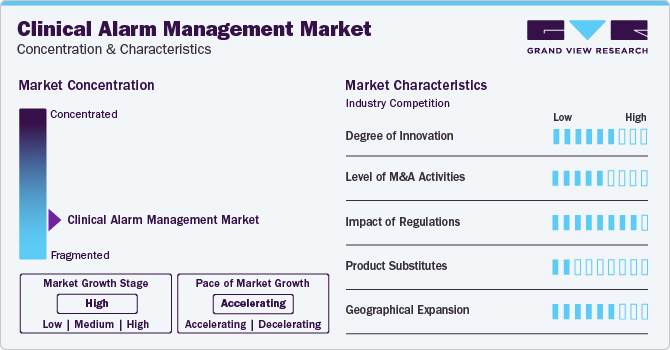
The market is also characterized by a high level of merger and acquisition (M&A) activity by leading players. For instance, in April 2023, Mobile Heartbeat collaborated with Akkadian Labs to integrate Akkadian Provisioning Manager with MH-CURE. This partnership is focused on simplifying the provisioning process for Mobile Heartbeat users, ultimately enhancing the clinical communication and collaboration experience for healthcare professionals.
The market is subject to increasing scrutiny in terms of regulations, number of market players, capital investment, and buyer landscape. Unlike medical devices, regulatory requirements and oversight for alarm management solutions and services are lax in both developed and developing economies.
For instance, in the U.S., several guidelines and industry standards for alarm management have been released only in the last decade, and there is a growing need for more standardized and validated regulations. The regulations currently adhered to in the market have been put forth by the Joint Commission, Association for the Advancement of Medical Instrumentation, in conjunction with the FDA, ECRI, and the American College of Clinical Engineering.
There are a limited number of direct product substitutes. As these solutions and services are unique in their application to monitor, identify, and optimize alarms generated at a healthcare facility, there are currently no internal or external substitutes for the product. The threat of substitutes is thus expected to be low.
Growth strategies, such as agreements, launch of advanced products, expansion of product portfolio, and partnerships with key players, boost market growth. For instance, in March, 2022, Koninklijke Philips N.V. announced the latest FDA 510(k) market authorization for HIMSS22, Philips Capsule Surveillance solution, for deployment across U.S. healthcare systems. Masimo accounted for significant shares in the North America regional market.
Component Insights
The solution segment dominated the market and accounted for the largest revenue share of 54.0% in 2023. This is owing to the rising adoption of connected care technologies in healthcare, initiatives by key companies, and the need to reduce alarm fatigue. The need to reduce adverse patient events & false/nuisance alarms and comply with regulatory mandates is anticipated to drive market growth.
The services segment is estimated to witness the fastest CAGR from 2024 to 2030 owing to initiatives by public and private health institutions, increasing service offerings by key players, and growing demand to minimize risks to patient safety, which is anticipated to fuel the segment growth. Technological advancements and a rising number of service providers are other factors expected to propel market growth.
Product Insights
The nurse call systems segment dominated the market and accounted for the largest revenue share in 2023. The factors attributed to this large share include product developments driven by wireless technology & automation, the need to improve clinical workflow & reduce operating costs for the healthcare facility while making optimum use of available resources. Also, growing funding for wireless technologies and IP-based nurse call systems is anticipated to boost market growth during the projected period.
The EMR integration systems segment is anticipated to witness the highest CAGR from 2024 to 2030. This mainly results from rising digitalization in healthcare, a surge in the adoption of EHR/EMR solutions from clinics to hospitals, and increasing interoperability across digital healthcare solutions. For instance, the Vocera Platform offered by Vocera Communications provides extensive interoperability solutions to enable clinical communication and workflow as part of a single platform.
End-use Insights
The hospitals and clinics segment dominated the market and accounted for the largest revenue share in 2023 due to the growing patient flow, rising emergency cases, and incorporation of sophisticated solutions. Moreover, the home care settings segment is estimated to grow due to the growing need of improvement in patient safety settings through effective patient monitoring and ensuring a timely response.
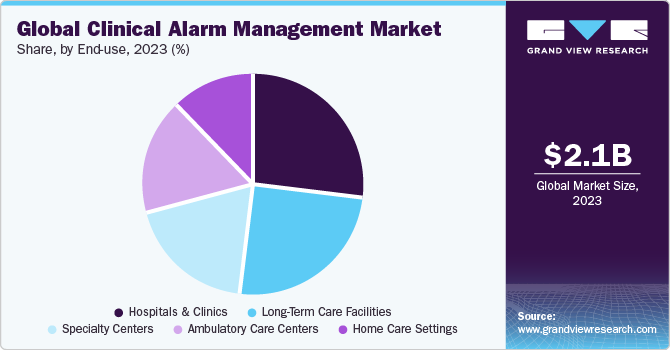
The long-term care facilities segment is anticipated to witness the fastest growth rate from 2024 to 2030 owing to the growing number of old-age facilities and increasing awareness regarding the importance of these solutions in these facilities. Alarm safety and alarm fatigue have emerged as critical issues in ensuring patient safety. Solutions require a multidisciplinary analysis at the systems level to identify the root cause.
Regional Insights
North America dominated the market and accounted for the largest revenue share of 43.7% in 2023, which is attributed to the growing significance of providing quality healthcare services. Increasing cases of alarm fatigue and favorable regulatory scenarios in the U.S. and Canada are further contributing to market growth in this region. Moreover, the presence of major market players in the region, such as GE Healthcare, Ascom, and Koninklijke Philips N.V., is expected to fuel market growth. Canada has a large number of inpatient hospitalizations due to various health problems. According to CIHI, in February 2022, acute inpatient hospitalizations in Canada were over 2.7 million between 2020 and 2021. Most common admissions were for cesarean section surgeries, followed by hip and knee replacements.
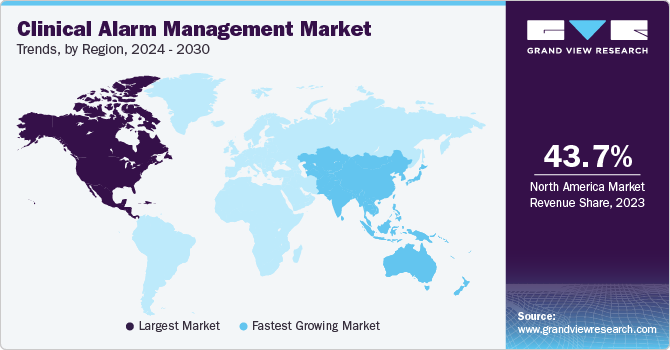
This led to increased usage of clinical alarms in hospital settings to alert doctors and nurses during emergencies. However, the possibilities and high frequency of false positive alarms have become a major challenge for healthcare teams. According to NCBI, 80%-99% of hospitals alarms were considered false or insignificant. The researchers introduced a new approach for such alarm fatigue problems with the help of an automatic reasoning mechanism that calculates false alarm probability. In Asia Pacific, the market is anticipated to witness the highest CAGR from 2024 to 2030. This can be attributed to the growing adoption of technologically advanced solutions for providing better healthcare facilities.
Furthermore, increasing investments in the healthcare sector in countries, such as Australia, China, India, and Japan, are expected to boost market growth. Japan provides a universal healthcare service that covers most of the hospitalized population. Japan’s statutory health insurance system funds nearly 98% of the country’s population for medical services. These offers can be availed from small clinics to large hospitals. Because of such free healthcare services offered, most of the population prefers inpatient hospitalizations, thereby increasing the patient pool in hospitals. For better management of the shortages of nurses, clinical alert systems with better management features are being installed in hospitals.
Clinical Alarm Management Company Insights
Some of the key players operating in the market include Koninklijke Philips N.V., General Electric Company (GE Healthcare), Ascom, and Spok, Inc.
-
Koninklijke Philips N.V. (Royal Philips) is the parent company of Philips Group, which handles all its healthcare technology businesses. Being the healthcare arm of its parent company, Philips Group is divided into four reportable business segments: Diagnosis & Treatment, Connected Care, Personal Health, and Other. The company is a global leader in improving people’s health through its wide portfolio of diagnostic, treatment, and homecare products & services
-
GE Healthcare, a division of General Electric Company, is a global publicly operated company involved in respiratory care systems and ultrasound machines. The company sells and manufactures radiopharmaceuticals and diagnostic imaging agents for imaging modalities used in medical imaging procedures
-
Vocera Communications, Capsule Technologies, Inc., Medtronic, and West-Com. are some of the emerging market participants in the artificial intelligence market.
-
Vocera Communications is a publicly operated multinational company involved in telecommunication. It offers the leading platform for clinical communication and workflow. It simplifies and improves the lives of healthcare professionals & patients, enabling hospitals to enhance their quality of care & operational efficiency
-
Capsule Technologies, Inc. is a privately held company involved in medical devices. The company is a global provider of medical device integration solutions for hospitals and healthcare organizations. It specializes in medical device integration, clinical surveillance, and patient monitoring
Key Clinical Alarm Management Companies:
The following are the leading companies in the clinical alarm management market market. These companies collectively hold the largest market share and dictate industry trends. Financials, strategy maps & products of these clinical alarm management companies are analyzed to map the supply network.
- Koninklijke Philips N.V.
- General Electric Company (GE Healthcare)
- Ascom
- Spok, Inc.
- Masimo
- Hill-Rom Services, Inc.
- Vocera Communications
- Capsule Technologies, Inc.
- Medtronic
- West-Com
Recent Developments
-
In June 2023, Niels-Stensen-Kliniken GmbH hired Ascom for a 1 million Swiss franc project to install the smart alarming system and IP-DECT infrastructure.
-
In April 2023, Philips and Northwell Health partnered for a seven-year agreement to standardize patient monitoring, enhance care, and improve outcomes. The collaboration aims to establish a platform for innovative technologies, ensuring scalability and flexibility
-
In March 2023, Ascom secured a frame agreement with UniHA, the French public hospital purchasing network, valued at around EUR 3 million. The collaboration aims to digitize patient monitoring, improve work conditions, and enhance care delivery
Clinical Alarm Management Market Report Scope
Report Attribute
Details
Market size value in 2024
USD 2.49 billion
Revenue forecast in 2030
USD 6.37 billion
Growth rate
CAGR of 17.0% from 2024 to 2030
Base year for estimation
2023
Historical data
2018 - 2022
Forecast period
2024 - 2030
Report updated
January 2024
Quantitative units
Revenue in USD million/billion and CAGR from 2024 to 2030
Report coverage
Revenue forecast, company ranking, competitive landscape, growth factors, and trends
Segments covered
Component, product, end-use, region
Regions covered
North America; Europe; Asia Pacific; Latin America; MEA
Country Scope
U.S.; Canada; U.K.; Germany; France; Italy; Spain; Denmark; Sweden; Norway; Japan; China; India; Australia; Thailand; South Korea; Brazil; Mexico; Argentina; South Africa; Saudi Arabia; UAE; Kuwait
Key companies profiled
Koninklijke Philips N.V.; General Electric Company (GE Healthcare); Ascom; Spok, Inc.; Masimo; Hill-Rom Services, Inc.; Vocera Communications; Capsule Technologies, Inc.; Medtronic; West-Com
Customization scope
Free report customization (equivalent up to 8 analysts’ working days) with purchase. Addition or alteration to country, regional & segment scope.
Pricing and purchase options
Avail customized purchase options to meet your exact research needs. Explore purchase options
Global Clinical Alarm Management Market Report Segmentation
This report forecasts revenue growth at the regional, and country levels and provides an analysis of the latest trends in each of the sub-segments from 2018 to 2030. For this study, Grand View Research has segmented the global clinical alarm management market report based on product, component, end-use, and region:
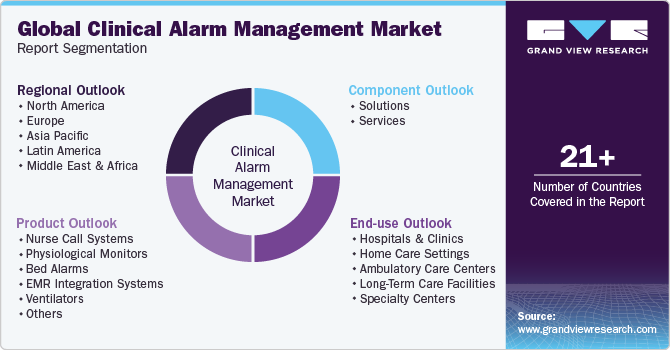
-
Product Outlook (Revenue, USD Million, 2018 - 2030)
-
Nurse Call Systems
-
Physiological Monitors
-
Bed Alarms
-
EMR Integration Systems
-
Ventilators
-
Others
-
-
Component Outlook (Revenue, USD Million, 2018 - 2030)
-
Solutions
-
Services
-
-
End-use Outlook (Revenue, USD Million, 2018 - 2030)
-
Hospitals & Clinics
-
Home Care Settings
-
Ambulatory Care Centers
-
Long-Term Care Facilities
-
Specialty Centers
-
-
Regional Outlook (Revenue, USD Million, 2018 - 2030)
-
North America
-
U.S.
-
Canada
-
-
Europe
-
Germany
-
U.K.
-
France
-
Italy
-
Spain
-
Denmark
-
Sweden
-
Norway
-
-
Asia Pacific
-
China
-
India
-
Japan
-
Australia
-
South Korea
-
Thailand
-
-
Latin America
-
Brazil
-
Mexico
-
Argentina
-
-
MEA
-
South Africa
-
Saudi Arabia
-
UAE
-
Kuwait
-
-
Frequently Asked Questions About This Report
b. The global clinical alarm management market size was estimated at USD 2.13 billion in 2023 and is expected to reach USD 2.49 billion in 2024.
b. The global clinical alarm management market is expected to grow at a compound annual growth rate (CAGR) of 17.0% from 2024 to 2030 to reach USD 6.37 billion by 2030.
b. North America dominated the clinical alarm management market with a share of 43.76% in 2023. This can be attributed to an increase in alarm fatigue and false positive alarms, initiatives undertaken by government bodies to minimize the consequences of non-actionable alarms, and a rise in the need for integrated healthcare IT systems to enhance reliability.
b. Some key players operating in the clinical alarm management market include Koninklijke Philips N.V., General Electric Company (GE Healthcare), Ascom, Spok, Inc., Masimo, Hill-Rom Services, Inc., Vocera Communications, Capsule Technologies, Inc., Medtronic, and West-Com
b. Key factors that are driving the clinical alarm management market growth include the increasing prevalence of alarm fatigue and the rise in adoption of clinical alarm management solutions by healthcare facilities coupled with technological advancements.
Share this report with your colleague or friend.
![gvr icn]()
NEED A CUSTOM REPORT?
We can customize every report - free of charge - including purchasing stand-alone sections or country-level reports, as well as offer affordable discounts for start-ups & universities. Contact us now
![Certified Icon]()
We are GDPR and CCPA compliant! Your transaction & personal information is safe and secure. For more details, please read our privacy policy.
We are committed towards customer satisfaction, and quality service.
"The quality of research they have done for us has been excellent."





